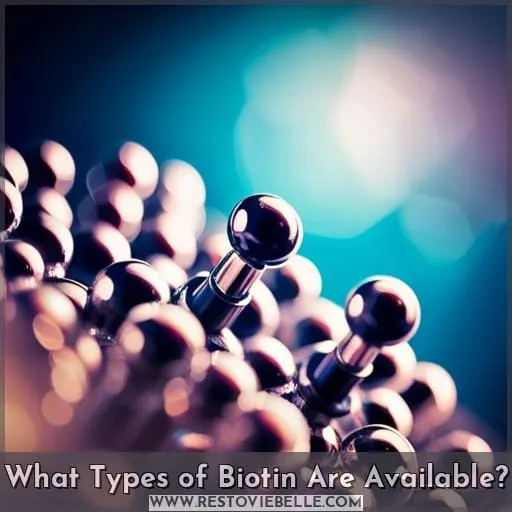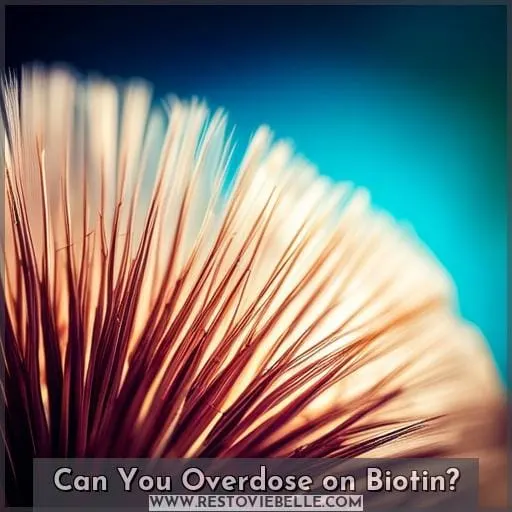This site is supported by our readers. We may earn a commission, at no cost to you, if you purchase through links.
 Adding biotin to your daily regimen may be the key to unlocking your hair’s full potential. This B vitamin has gained commercial popularity for its claimed benefits on healthy hair and nail growth, but how much do you need? Research confirms that a lack of biotin can lead to thinning or loss of locks, so it pays off to know more about this essential component for beautiful tresses.
Adding biotin to your daily regimen may be the key to unlocking your hair’s full potential. This B vitamin has gained commercial popularity for its claimed benefits on healthy hair and nail growth, but how much do you need? Research confirms that a lack of biotin can lead to thinning or loss of locks, so it pays off to know more about this essential component for beautiful tresses.
If you’ve always wanted thick and luscious locks without resorting to harsh chemicals, understanding how much biotin is necessary for optimal hair health could be the answer.
Table Of Contents
- Key Takeaways
- How Much Biotin is Needed for Hair Growth?
- What Types of Biotin Are Available?
- Are There Any Side Effects of Biotin?
- Can You Overdose on Biotin?
- Does Biotin Really Promote Hair Growth?
- What Are the Best Biotin Supplements for Hair Growth?
- When Should You Consult a Doctor for Hair Loss?
- Conclusion
Key Takeaways
- Biotin can enhance hair health, but its effectiveness for hair growth is unproven.
- The recommended daily intake of biotin is 30 mcg for adults, 35 mcg for pregnant individuals, and up to 3 mg for alopecia.
- Dietary sources of biotin include eggs, salmon, legumes, nuts, and whole grains.
- It is important to consult a doctor before supplementing with biotin, especially if on medications, and to stay within recommended dosage limits to avoid side effects.
How Much Biotin is Needed for Hair Growth?
For healthy adults, the recommended daily biotin intake is 30 mcg. If you suffer from alopecia, higher doses of up to 3 mg may be needed. Biotin may contribute to hair growth and health, but it’s not a miracle cure-all for everyone.
Recommended Daily Intake
You can enhance your hair health with the correct daily intake of biotin! The recommended dosage for adults is 30 mcg, while pregnant individuals should take 35 mcg, and those with alopecia may need up to 3 mg.
Biotin sources include foods like eggs and salmon, as well as mega-B vitamin combinations or infused shampoos. While generally safe, excessive biotin could lead to stomach issues or interfere with lab tests – so it is advisable to speak to a doctor before taking any supplements.
Biotin Dosage for Hair Health
The recommended daily biotin intake for adults is 30 mcg, while pregnant individuals may need 35 mcg and those with alopecia may require up to 3 mg. Biotin supplements are often used to support hair growth, although there is limited evidence supporting its benefit in healthy people.
However, biotin deficiency can contribute to hair loss and other skin issues. Eating a balanced diet rich in eggs, nuts, and legumes provides sufficient amounts of the vitamin naturally; no additional supplementation is necessary.
Additionally, natural remedies like caffeine, fish oil, or zinc can provide some benefits for hair health without risking excessive dosages or side effects from supplementing biotin excessively.
Higher Biotin Dosage for Alopecia
If you’re experiencing alopecia, it may be beneficial to take a higher dose of biotin for hair health.
Biotin contributes to the development of skin, nails, and hair.
Research shows that taking up to 3mg daily can help with treating androgenetic alopecia (male-pattern baldness).
Hair loss solutions, such as nutritional support or dietary supplements like mega-B vitamins, also play an important role in improving hair health overall.
Additional studies suggest that while biotin is not a miracle solution for regrowth, its effectiveness in treating some forms of thinning is supported by research evidence.
Higher doses should only be taken under doctor supervision; excessive intake could lead to incorrect lab test results.
What Types of Biotin Are Available?
When searching for ways to increase biotin in your diet, there are numerous options available. Biotin-rich foods such as eggs and salmon provide the vitamin naturally, while combinations of mega-B vitamins can supplement an individual’s daily intake.
Additionally, using biotin-infused shampoos regularly may help with hair fullness.
Biotin-rich Foods
To optimize your hair health, include biotin-rich foods like eggs and salmon in your diet. Other nutrient-rich sources are legumes, nuts, tomatoes, and whole grains. Get adequate intake of biotin from these natural providers to ensure healthy hair growth.
Don’t forget about vitamin B7 supplements either! Mega B vitamins can help supplement the naturally occurring levels of biotin found in food products for an extra boost to promote strong strands without any harmful side effects.
By eating a balanced diet full of nutritious ingredients as well as taking additional nutritional supplements when needed, you’ll be able to maintain optimal amounts for proper functioning within the body and beneficial results on the outside too!
Mega-B Vitamin Combinations
Unlock the secret to luscious locks with mega-B vitamin combinations! Mega-B vitamins provide additional biotin for hair care, along with other nutritional support. They can further reduce hair loss and prevent interference in laboratory tests due to excessive biotin intake.
However, it is important to note that there are potential side effects from taking such supplements as well. When considering using a mega-B vitamin combination for your hair growth needs, be sure to consult a doctor or healthcare professional first about any possible risks involved.
Biotin-infused Shampoo
You may have heard of biotin-infused shampoos, which contain added levels of the vitamin to potentially promote hair fullness. While limited data supports its efficacy in healthy individuals, some studies suggest it can help with female pattern balding and other forms of hair loss.
However, there’s no clear evidence that biotin shampoo is more effective than regular shampoo.
Alternatives such as essential oils or dietary supplements may be better options for promoting hair health without risking potential side effects from excessive biotin intake.
Are There Any Side Effects of Biotin?
When considering biotin for hair growth, it is important to understand the potential side effects. While biotin supplements are generally safe, excessive amounts may lead to stomach issues and skin rashes.
It is recommended that individuals consult a doctor before taking any form of supplement or medication to ensure safety and reduce the risk of adverse reactions.
Potential Side Effects
Be aware: Taking too much biotin can lead to unwanted side effects. Dermatologist Wilma Bergfield recommends that adults get at least 30 micrograms (mcg) of biotin daily for optimal hair health, with pregnant individuals needing up to 35 mcg.
However, the FDA has not provided a recommended daily allowance, and high intake levels can interfere with certain lab tests and cause stomach issues or skin rashes. Biotin supplements are generally safe, but potential side effects should be considered before taking them in excess amounts as advised by your doctor or dermatologist if you’re on medications like anticonvulsants.
These medications could affect vitamin absorption from food sources like eggs, nuts, legumes, etc., and result in deficiencies leading to hair loss among other symptoms such as confusion, nausea, and muscle pain.
Interference With Lab Tests
Before taking biotin supplements, be aware that high doses of the vitamin can interfere with certain lab tests. Biotin is known to bind to avidin and streptavidin present in some diagnostic assays, leading to inaccurate results.
This could affect test accuracy when measuring thyroid-stimulating hormone (TSH) or testosterone levels.
To preserve diagnostic accuracy, doctors recommend discontinuing biotin consumption two days before undergoing these tests. Research also suggests that long-term use of large amounts of biotin may lead to false conclusions regarding other laboratory parameters such as creatinine and liver enzymes like ALT and AST values too.
Therefore, it is important for healthcare professionals treating patients using a lot of this supplement for hair growth purposes not only to explain potential side effects but also to advise them about avoiding any interference with their lab tests by temporarily stopping their dosage two days before getting tested!
Can You Overdose on Biotin?
Excessive biotin intake can cause unexpected side effects, so don’t go overboard with the ‘hair of steel’ you dream of! While it’s important to get enough biotin for healthy hair and nails, taking too much can have adverse effects.
It is possible to overdose on biotin if taken in excessive amounts over a prolonged period. Taking more than 10 mg per day may interfere with lab tests and cause other health issues such as stomach problems or skin rashes.
Biotin supplementation should only be used when needed, like when there is an underlying deficiency causing hair loss or impaired growth.
For those looking for natural remedies to promote healthy locks, consider dietary changes along with nutrient-rich supplements like fish oil capsules or zinc tablets instead of relying solely on mega-doses of biotin pills that boost levels above what your body needs naturally each day (30 mcg).
If at any point you experience unusual symptoms related to your hair health journey—like confusion or muscle pain—consult a doctor immediately; these could be signs that something else is going wrong beyond simple vitamin deficiencies.
Ultimately, understanding the risks associated with supplementing high doses are key in maintaining optimal overall wellness while targeting specific beauty goals.
Does Biotin Really Promote Hair Growth?
You may have heard that biotin, also known as vitamin B7, can promote hair growth. But how much do you need for it to be effective? Let’s take a look at the evidence behind this popular supplement.
Limited Scientific Evidence
Though biotin may seem like a miracle cure, there is limited scientific evidence to support its efficacy for hair growth. Studies have yet to prove how it affects the mechanisms of hair production in healthy individuals.
Nutrition is known to play an important role in maintaining healthy locks; however, there is no consensus on whether or not additional biotin intake can boost hair health beyond that which comes from dietary sources alone.
Biotin safety has been established, and side effects are generally minor, but excessive intake must be avoided as it could interfere with laboratory test results.
Hair loss causes vary widely, so if you’re experiencing sudden thinning or baldness, consider consulting your doctor before taking any supplements, including biotin, as deficiency isn’t always the cause of alopecia-related issues.
Nutritional support may help maintain normal follicle functioning, but more research is needed in this area before concrete conclusions can be drawn about its effectiveness for promoting new growth without the risk of unpleasant side effects, such as nausea and skin rashes due to overconsumption.
Alternative Remedies for Hair Growth
Although biotin isn’t a miracle solution for hair growth, there are alternative remedies that may help support healthy hair. Nutritional supplements like fish oil, melatonin, and zinc have been studied for their potential benefits in promoting scalp health.
Dietary choices such as saw palmetto and green tea can also be beneficial when it comes to encouraging good follicle health. Additionally, lifestyle factors like stress management and regular scalp massage can play an important role in keeping the scalp nourished with essential nutrients.
Ultimately, incorporating these natural remedies into your daily routine, along with a balanced diet of vitamins, could provide long-term positive results for healthy hair maintenance!
What Are the Best Biotin Supplements for Hair Growth?
Considering the limited evidence of biotin’s effectiveness in hair and nail growth, you may be wondering what are some effective supplements to support your hair health. Biotin is an essential water-soluble vitamin (B7) that can help with skin, nail, and hair development, but it’s not a miracle solution for everyone.
While dosage recommendations vary, from 30 mcg daily for adults to 35 mcg during pregnancy or up to 3 mg when treating alopecia, the FDA lacks a recommended daily allowance.
There are many natural sources of biotin, including eggs and salmon, as well as mega-B vitamin complexes, which supplement intake. However, excessive amounts can cause side effects such as stomach issues and rashes, so consulting a doctor before use is advised.
Additionally, various nutritional supplements like caffeine, fish oil, melatonin, and zinc have been linked by research studies to helping improve overall scalp health too!
Ultimately, while there’s no one-size-fits-all approach on how much biotin you need for healthy hair growth, finding top-quality brands and understanding proper dosage tips will help ensure safe supplementation without any adverse side effects.
When Should You Consult a Doctor for Hair Loss?
It’s best to consult a doctor if you’re experiencing unexpected or unusual hair loss, as biotin deficiencies are rarely the cause. Medical evaluation is essential for determining the underlying causes of hair loss and developing an appropriate treatment plan.
Hair loss can be caused by lifestyle factors like stress, poor nutrition, certain medications, and medical conditions such as alopecia areata or telogen effluvium. In some cases, vitamin C deficiency and memory problems may also contribute to hair thinning.
A doctor will take into account your age, health history, and other factors when considering possible treatment options. These might include dietary changes with increased intake of protein-rich foods, fish oil supplements, or topical applications containing minoxidil.
If biotin levels appear low on lab tests, supplementation may be recommended. However, it should only serve as an adjunct to other treatments prescribed by your physician. Depending on individual circumstances, further medical testing may be necessary.
It’s important not to exceed recommended daily amounts of biotin without consulting a healthcare professional first. Excessive doses can cause muscle pain. At this time, there isn’t enough data demonstrating benefits from taking higher than usual dosages for healthy individuals who don’t have any known vitamin B7 deficiencies.
Conclusion
As the old adage goes, you are what you eat, and when it comes to hair growth, biotin plays an important role. For adults, the recommended daily intake of biotin is 30 mcg. For those with hair health concerns, a biotin dosage of 500-1,000 mcg is suggested to see results.
Various sources of biotin are available, such as biotin-rich foods, mega-B vitamin combinations, and biotin-infused shampoo. While biotin can help with hair health, it’s important to consult with a doctor to ensure that biotin deficiencies aren’t the primary cause of hair loss.
Ultimately, biotin may be beneficial for hair growth, but its effectiveness is still largely unproven.












